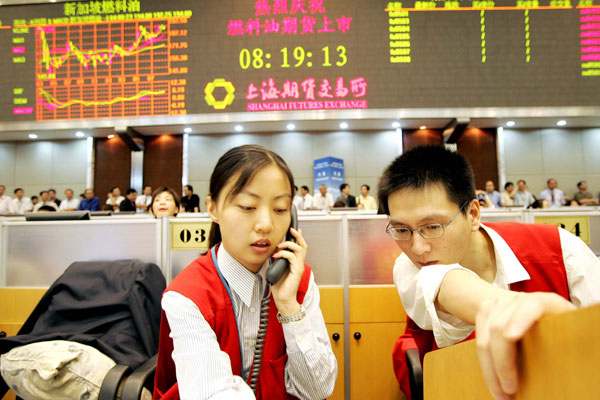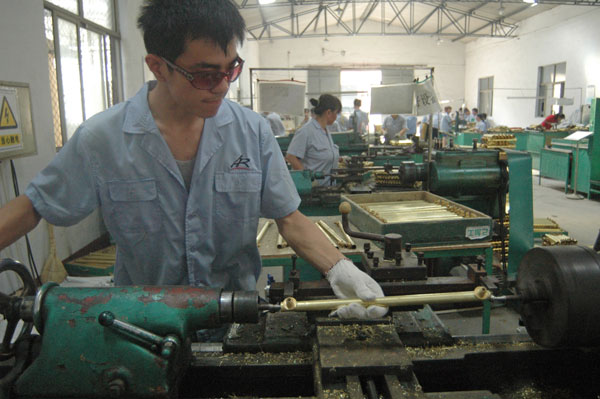Futures is here
Updated: 2015-08-07 09:22
By Cecily Liu(China Daily Europe)
|
|||||||||||
 |
|
Chinese brokers work on fuel oil trade at the Shanghai Futures Exchange in Shanghai, China, in this file photo.[Photo/IC] |
Chinese firms have recently adopted a different approach, in which they just purchase a majority stake in commodity producing companies, in the process gaining control of the supply chain.
For example, food company COFCO (China National Cereals, Oils and Foodstuffs Corporation) bought a majority stake in the Hong Kong-based food trader Noble Group Ltd's agribusiness and a majority stake in the Dutch trader Nidera in 2014.
Noble's grains and oilseeds operations focus on South America, Europe and Asia. It operates three oilseed processing factories in Asia, and supplies grains, oilseeds, vegetable oil and by-products throughout the region from Singapore. Noble also trades sugar, coffee and raw materials, such as iron ore.
The Noble and Nidera deals mark the biggest overseas acquisitions in China's grain sector, with a combined $2.8 billion investment. "This new approach is more subtle as it allows China to control important commodity supply without causing any political backlash," Chehab says.
He says as a part of this trend, Chinese financial firms find a new channel to start financing many of the commodity producers' projects, and it also ties in with the phenomenon of Chinese banks expanding more into global commodity financing.
Meanwhile, China is also setting up its own commodity exchanges to allow Chinese buyers and sellers to trade on a platform in their own time zone, an area closer to their physical presence, and in a financial market with which they are more familiar.
Because commodity exchanges in China have trades denominated in renminbi, Chinese participants are not subject to exchange risks or capital controls that they would face by participating in overseas exchanges.
China has three key commodity exchanges, the Shanghai Futures Exchange, established in 1999; the Dalian Commodity Exchange, established in 1993; and the Zhengzhou Commodity Exchange, established in 1990. None allows foreign participation because of China's capital controls.
However, later this year, China will launch the Shanghai International Energy Exchange, which will be located inside the Shanghai Free Trade Zone, allowing foreign traders to participate.
Berland says as China develops more mature futures markets, these markets may take away trading volumes from some of the world's international exchanges, but this would benefit China-based market players.
He says it is also beneficial that the Chinese government allow those markets to stay open to some foreign participation because although China has a large financial market, foreign participants can add more liquidity to China's futures markets. The result would be stronger markets and better risk management for local commodity producers.
"It is understandable that the Chinese government may not necessarily want foreign investors to hold China-based physical commodities, but having them participate in the futures market should be encouraged as it can provide liquidity without the risk of controlling physical assets," he says.
Fang Jian, a partner at the London-headquartered law firm Linklaters, says that China's three biggest domestic exchanges are all exploring how they can best open up to foreign trading, and it's possible that the government would eventually allow certain foreign traders who meet certain criteria.
"What the Chinese regulators are doing currently is realistic. The process of liberalization for commodity trading in China may be quite similar to the process of gradually allowing qualified foreign institutional investors to participate in China's stock market," Fang says.
Despite the Chinese commodity exchanges being relatively young, they have already gained significant influence in the commodity industry because of the massive volume of trade in the country. They are also increasingly providing benchmark prices for commodities in their respective sectors, according to Daniel Morgan, global commodity analyst at UBS.
For example, iron ore traders now look to the Dalian Commodity Exchange for iron ore prices as a reference point, due to the large volume of trade on the exchange. Previously, the global price for iron ore was set by iron ore producing and consuming countries collectively, including Japan, Brazil and Australia, Morgan says.
While a new exchange may find it difficult to set up a benchmark price for a certain type of commodity with wide acceptance from the buyers, sellers and banks involved, Chinese exchanges have a natural advantage as China consumes a large volume of commodities, Morgan says.
"As many iron ore buyers use the Dalian Commodity Exchange to hedge their risks, the exchange quickly received significant liquidity. When it first started trading, we and other people in the market were surprised by how quickly this liquidity came. Given its status now, it's hard for anyone else to try to wrest it away," he says.
The addition of commodity exchanges in China would complement existing commodities hubs in the US, UK and Singapore by facilitating trade in a different time zone, offering traders the convenience of buying and selling around the clock, he says.
cecily.liu@chinadaily.com.cn
Today's Top News
China rejects Philippine, Japanese, US claims on S. China Sea issue
MH370 passengers' families want more answers
'New Suez Canal' opened
for ship traffic
Trump won't rule out third-party run
China asks further probe into MH370
China's property taxes coming soon
Seven arrested for trafficking women into sex slavery in China
ROK's ex-first lady begins
DPRK visit
Hot Topics
Lunar probe , China growth forecasts, Emission rules get tougher, China seen through 'colored lens', International board,
Editor's Picks

|

|

|

|

|

|






